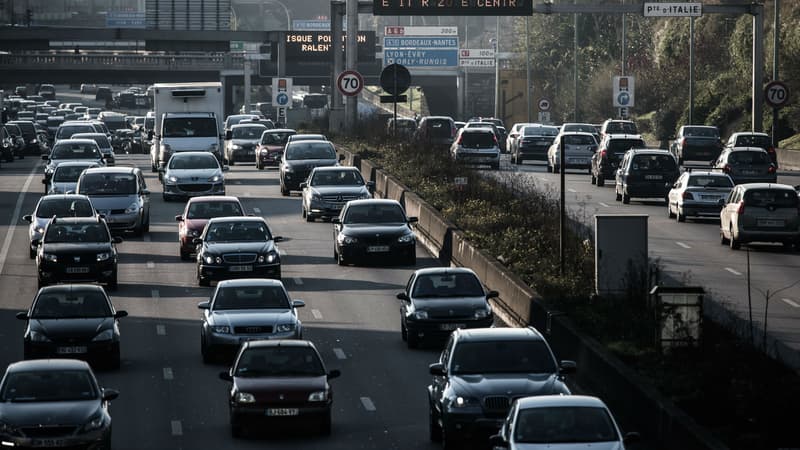The car is still the preferred means of transport to go to work. 75% of French workers use it on a daily basis, according to the latest “Mobility and business” barometer Alphabet France* published this Wednesday, November 30. A slightly higher figure than in 2019 and a rate of 72% at the time. Clearly, the pandemic has had a notable effect: the modal share of the car in this same barometer was 81% in 2017, but, after this sharp decline, it had risen to 76% in 2021.
A “covid effect” still visible
The study notes, however, that “most ‘soft’ mobility alternatives are on the rise again” compared to the previous two years, even if there is a slight decline compared to the pre-Covid period. “Classic soft transport” (walking, cycling and scooter) is used by 35% of workers (33% in 2021, but 38% in 2019) and “soft electric transport” (assisted bicycle and scooter) by the 7% of workers (5% in 2021, 6% in 2019).
The rate of use of public transport remains stable compared to 2021, one in five workers uses it to go to work, but this mode of travel has dropped 7 points compared to 2018. As expected, 81% of users of this public transport lives and works in big cities.
It is also in these dense urban areas where the Alphabet barometer evokes a greater use of motorized two- and three-wheeled vehicles, 65% of thermal scooter users come from an agglomeration of more than 100,000 inhabitants, 57% electric. Same observation for soft mobility: 73% of users of classic bicycles and 61% of electrically assisted bicycles.
A journey of 20 kilometers in 25 minutes
On average, a French worker travels 20 kilometers in 25 minutes to get to work. “However, these trends differ depending on the region, the size of the agglomeration and the areas (urban, rural, mixed) in which these trips take place,” the Alphabet France press release notes.
An important point for the morale of workers: as last year, 24% of those surveyed believe that this home-work mobility “negatively impacts their QVT (quality of life at work) and 72% mention a waste of time”.
An economical option…
In a context of fuel prices at relatively high levels, the study recalls the importance of cost in the choice of mode of transport. Given the rise in prices at pumps, one in three workers who use a thermal car claims to have changed their way of getting around to go to work or make business trips.
Although the price of tickets and transport passes should increase next year in many cities and regions, this economic criterion remains the main choice criterion for public transport users, with 54%, as well as for users of the conventional soft transport, with 45%. and electricity, 40%.
… and ecological
The ecological criterion is also gaining more importance in the choice of workers: 42% mention this environmental factor among users of electric “soft transport” as 44% of users of public transport and conventional “soft transport”. Slightly more than a quarter of the drivers of two or three wheels and electric cars also justify the choice of their “daily” transport for this environmental concern.
On the contrary, the car usually appears as a forced choice. 45% of the drivers of thermal vehicles explain that they really do not have the possibility of adopting more appropriate alternative solutions. A rate that drops to 29% without ceasing to be significant among users of electric or hybrid cars.
Companies, protagonists of mobility
The company seems to be a leading lever to change practices: 59% of workers say they benefit, in this context, from mobility solutions or services to improve their quality of life at work.
For 52% of them, the economic savings, through the payment of part of the transport expenses for example, represents the main advantage, increasing compared to 2020 and at a rate of 43% and well ahead of other criteria such as comfort, saving time or the feeling of reducing pollution.
Among the proposed solutions, 13% of workers mention a company car or an equivalent service established by the employer, 20% the reimbursement of mileage expenses and 24% the partial or total reimbursement of public transport tickets .
Another trend, the barometer points to a slight increase in interest in charging stations for electric cars available in the workplace: from 5% in 2020, now 7% can access a plug, and 12% of the active would like to benefit from it.
Finally, 6% of workers have access to a budget or mobility package, which allows them a bit like restaurant vouchers to use a certain monthly amount to travel, and 23% want their company to offer this system. In fact, this solution is more flexible, especially suitable for an employee who can choose between several mobility solutions and who can therefore decide for himself between refueling, buying a transport ticket or renting a car, a bicycle or a scooter.
*Methodology: Online study carried out by Ifop for Alphabet France from September 1 to 9, 2022 among 1,003 active French people over 18 years of age. The representativeness of the sample was ensured by the quota method.
Source: BFM TV


